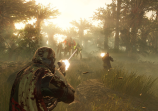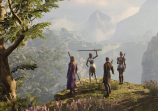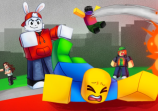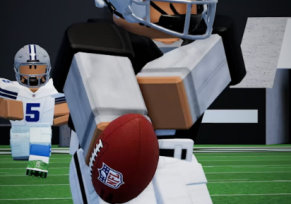Dark fantasy action-RPG Grim Dawn has been under development for several years by the small indie team at Crate Entertainment, which features veteran members of Titan Quest development group Iron Lore. Following a successful Kickstarter period in 2012, the developers are hard at work improving the playable alpha that's available on Steam now, and I was given a chance to play through the current build.
When I began Grim Dawn, the Act II update had just been released, which added more features and improvements as well as increasing the level cap to 35. I have invested almost 30 hours into the game as of today, and I came away feeling generally positive about the experience despite having some significant issues with the combat and death system.
The setting, as the title of the game may give away, is a gloomy Victorian era-inspired world in which humanity is clinging to survival. Magical foreign invaders are waging war against one another in what used to be home to a powerful human empire, and only scattered pockets of survivors remain.
The story isn't explored very deeply at the start of the game, but you can find out more as you play through conversations with NPCs and notes that you come across. What you do quickly learn is that your player has been touched by the foreign magic, a nearly fatal experience. Instead, you survive with the ability to enter and open portals--a useful mechanic for navigating the world's map in addition to a narrative element.
You can customize loot with upgrades you find, which add elemental effects or attribute increases. I found a lot more armor than I did weapons, which led to me holding onto only a couple of guns throughout my entire play-through. I would've liked to see a few more weapons so I felt like I was improving, but combat for my class came down much more to my skills and attributes than my rifle.
Grim Dawn is still in alpha, which means some of my issues are still likely to be addressed. I may have found a more preferable difficulty level than normal had I explored the others, but normal is likely to be the most-played, and investing dozens of hours in more than one file to test which difficulty is best is a task I did not have time for.
Multiplayer should benefit Grim Dawn greatly, as tearing through enemy mobs is likely much more fun with a couple of partners. The team at Crate has done a fine job crafting a unique world which should continue to be improved in the future, even if it has its share of problems now. The Early Access alpha is very playable, so if you're a fan of the action RPG genre I would recommend checking it out on Steam. Grim Dawn might not be for everyone, but fans of the genre will appreciate its traditional roots, attractive graphics and tough battles.
---
Grim Dawn was previewed from a Steam code provided by the publisher. You can purchase the Steam Early Access alpha for $24.99 or get it directly from the publisher here, which will give you access to all of the upcoming Acts, as well as the final version.








